#caroline bonaparte murat
Text
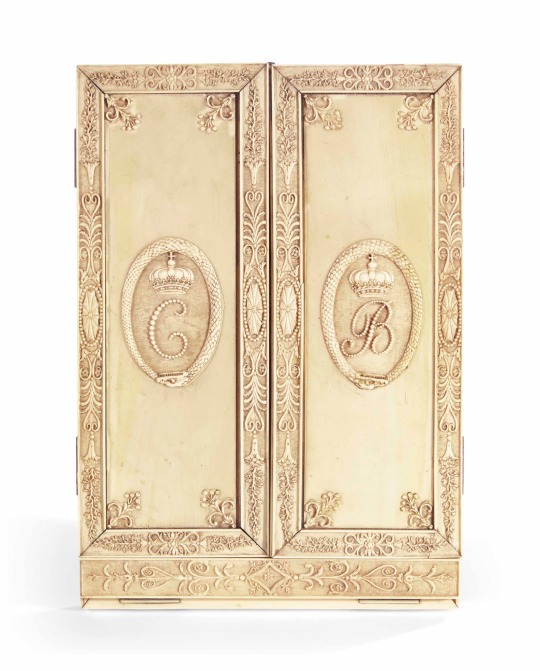
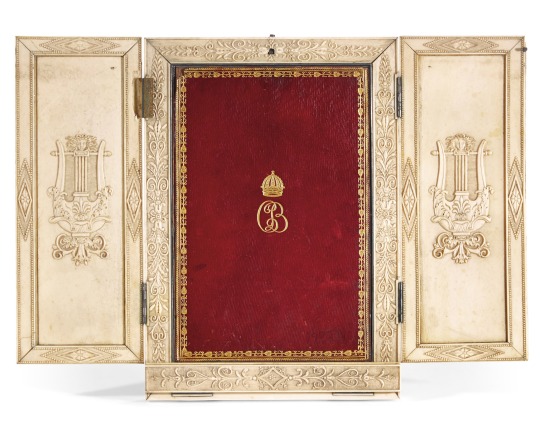
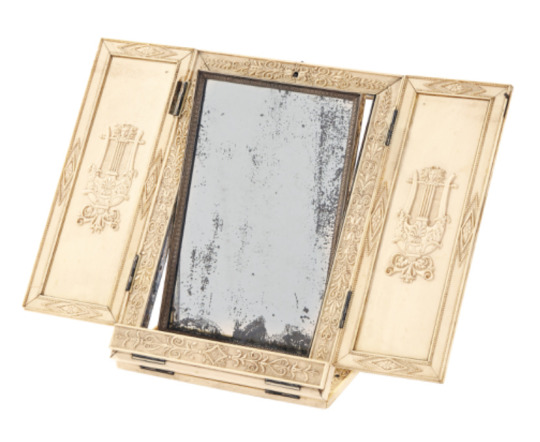
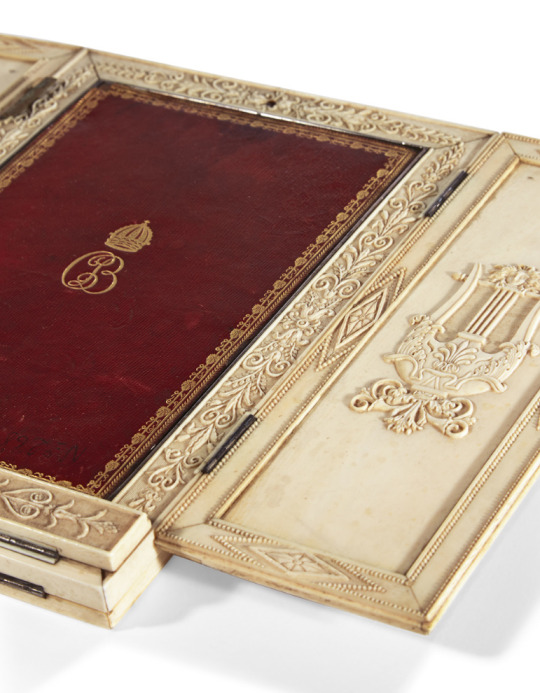
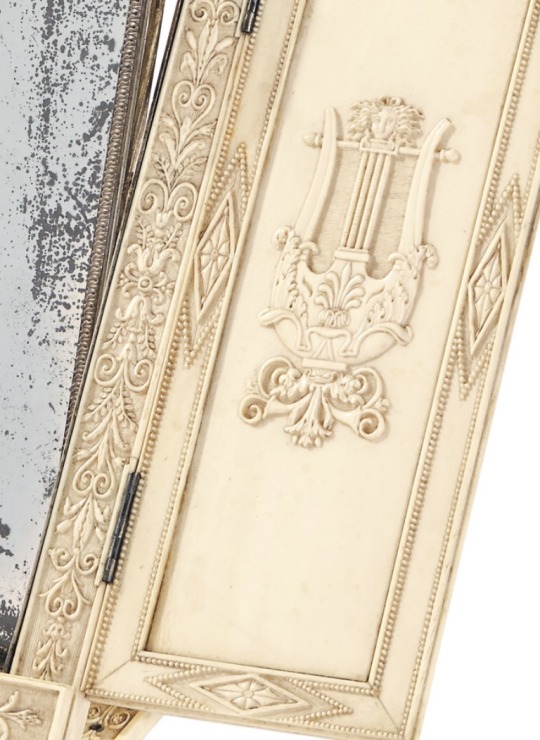
First French Empire era travel mirror. Monogram of Caroline Bonaparte.
(Christie’s)
#Caroline#Caroline Bonaparte#Caroline Bonaparte Murat#travel mirror#mirror#empire style#napoleonic era#napoleonic#Napoleon’s sisters#first french empire#french empire#19th century#1800s#Christie’s#auction#france#history#french history#artifact#napoleon#art#neoclassical#neoclassicism#empire
101 notes
·
View notes
Text
Happy Birthday to the king and queen of Naples

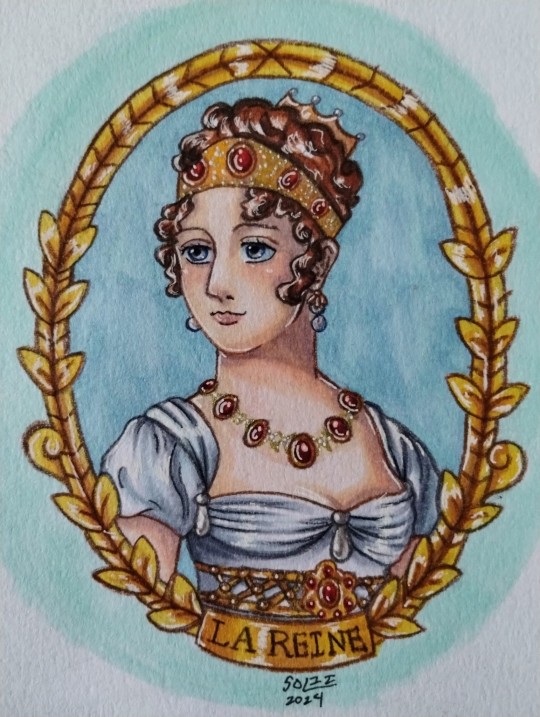
#napoleonic era#napoleon bonaparte#french history#my art#joachim murat#caroline bonaparte#art#napoleonic wars#artists on tumblr#napoleon's marshals#posting this an hour early cuz yo girl needs some sleep
94 notes
·
View notes
Text
Seeing the Memoirs of Mademoiselle Avrillion mentioned recently in an exchange between @josefavomjaaga and @phatburd, I figured I'd look through them for anything pertaining to the Murats. (I'm not convinced that she's the same person as Élisabeth de Vaudey though; Mlle Avrillion's memoirs are listed in the references sections of her Wiki page but there is nothing to indicate they are the same person that I've found; if either of you have since turned up anything to the contrary, please share.) Anyway, she had some interesting details and opinions on the two. I hope you all enjoy!
Excerpt:
The emperor often took the subject of his brother-in-law’s costumes for the text of his jokes; I have even heard him mock them seriously and with bitterness. Furthermore, I am authorized to believe that, deep down, the emperor did not like Prince Murat, and he spoke of him, in general, in an unobliging manner. His curly hair falling on his shoulders, which made him resemble a king of theatre, particularly displeased him; and if the emperor disdained to deal openly in such puerilities, it was not so in his moments of intimacy with the Empress, where nothing escaped his critical observations.
#Joachim Murat#Napoleon#Napoleon Bonaparte#Caroline Murat#Caroline Bonaparte#Josephine#memoirs#Napoleonic#translations#blog#history#19th century
65 notes
·
View notes
Text
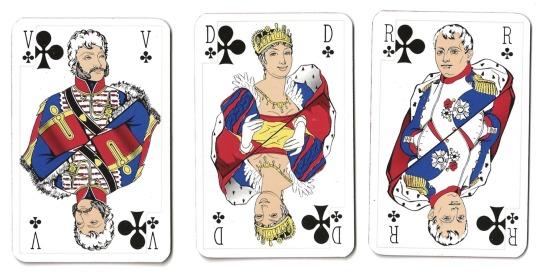

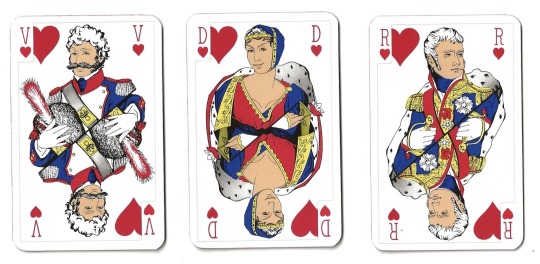

Catel & Farcy 1960s Napoleon Playing Cards
♣️: Napoleon and Josephine
♠️: Soult and (I presume?) his wife Louise
♥️: Lannes and Pauline
♦️: Murat and Caroline
All of the Jacks/Valets are just soldiers, not specific people; all of the numbered cards and aces are regular cards.
#napoleonic#my napoleonic playing cards#catel & farcy#napoleon bonparte#empress josephine#marshal soult#marshal lannes#pauline bonaparte#caroline bonaparte#marshal murat
28 notes
·
View notes
Text

happy birthday to the power couple!
illustration by jacques onfray de breville (job)
29 notes
·
View notes
Text
JACOBIN FICTION CONVENTION MEETING 36: THE GAME OF HOPE (2018)
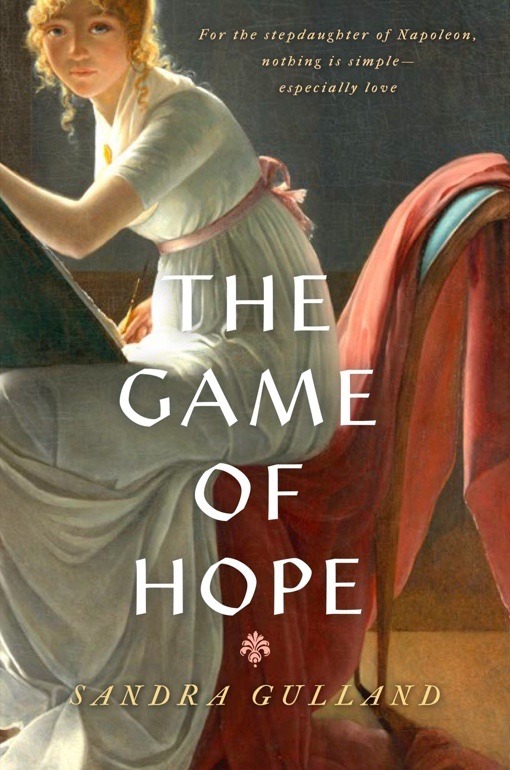
1. The Introduction
Well, hello there, Citizens and Neighbors! I’m alive and back with a review, as promised. (Very happy about it too because I missed you!)
Now, to cut to the chase, @josefavomjaaga was the first person who told me about the novel’s existence, which had me a bit intrigued already due to my constant search for new media to consume and review.
However, my dear friend @tairin helped seal the deal and officially put this particular piece onto my review bucket list, as a physical copy of the book (in Russian) was her present for my birthday last year. I read the book back then but, due to all the other reviews and personal life stuff, kept putting away this particular review.
Fortunately, I finally found free time to catch up on the piece and post it, so here we go.
Before we proceed, here’s a link for anyone who wants to download the book in English. As mentioned, it’s available in Russian too, but Russian-speaking members of my audience will need to purchase the epub or a physical copy to be able to read it. I’m not sure if it’s available in any other languages.
Also, this review is dedicated to @josefavomjaaga , @tairin and @frevandrest ! Okay, let’s. Fucking. Begin.
2. The Summary
“The Game of Hope” tells the story of Hortense de Beauharnais, Napoleon’s stepdaughter, and her coming of age journey, including crushes, rivalries, and her life at Madame Campan’s boarding school for girls.
Although I loathe Hortense with a passion, review material is review material and I was still intrigued by the premise, so let’s see how this premise plays out in the book!
3. The Story
Generally, I enjoy coming of age stories and YA novels and, luckily, this one is no exception. It is melodramatic, but it’s justified because Hortense is a teenager and a dramatic person, so her POV having melodrama is expected.
It’s a slice of life kind of story and most political events happen in the background but still realistically affect the characters, which is realistic and very neat!
Also, this is by far the only book where anti-Frev sentiments don’t give me an urge to flip the fuck out, since Hortense lost her father and almost lost her mother during Frev and is far too naive and young to understand politics! Of course she will think Frev is evil and of course she will believe that being noble would be enough to have her executed!
The pacing is great too. There are some time skips but the author clearly knew when to do them and when to slow down. Now complaints here.
If you are craving a story with typical teenage melodrama involving historical figures, then I guess it’s a book for you.
4. The Characters
I don’t like Hortense as a person here, but as a character she’s realistic and nuanced. She has the selfish and bratty nature that would stick way into adulthood, but she genuinely loves Eugene and her friends at the boarding school. Also her resentment towards her stepfather and the Bonaparte siblings is quite realistic, as from her point of view they’re just asses towards her mother for no reason.
Caroline Bonaparte starts off as a rude bitch (also thanks to Hortense incorporating her own bias), but luckily she becomes more and more nuanced along the way and becomes sort of a frenemy to Hortense. Caroline clearly doesn’t enjoy studying under Madame Campan and wants out of there. Perhaps due to my bias, or because we don’t see her POV, Caroline grew on me more than Hortense.
Eugene (I HAVE to mention him) appears later on in the story and, as expected, is an absolute cinnamon roll.
Josephine is idealized in the story by Hortense, but she isn’t flawless and keeps trying to find Hortense a husband in the beginning. However, she also helps Caroline and Joachim marry, which makes their treatment of her later on a fucking dick move.
Émilie, Hortense’s cousin and close friend, is slightly older and already married (not that unheard of back then), but is still a teenager going through the typical motions common for that age. She is more mature than Hortense and feels trapped in a loveless marriage with Captain Lavalette (no idea who that is).
Campan is very strict but genuinely cares about her students. I liked the part where she has The Declaration of the Rights of Man and Citizen attached to the back of a portrait of Marie-Antoinette and flips the portrait when inspection arrives. Simple, but quite clever!
5. The Setting
No complaints here! Gorgeous descriptions that are very much historically accurate, and Hortense’s POV is conveyed masterfully, which aids the story greatly.
6. The Writing
Simple yet beautiful, without diving too much into purple prose territory and doesn’t shy away from mentioning or implying normal things like periods or sex. I can sense some pearl clutching might happen, but personally I think these topics should be normalized so I don’t complain. Also, my copy graciously included translations of Italian phrases, which is doubly awesome!
7. The Conclusion
Overall, an excellent, overall accurate and believable story! I highly recommend it to anyone interested in learning more about Hortense or just looking for a Frev/Napoleonic coming of age story without too much action.
Alright, on this note, I’m concluding today’s meeting of Jacobin Fiction Convention. Stay tuned for updates, guys!
Love,
Citizen Green Pixel
#french revolution#frev#jacobin fiction convention#frev art#book review#a game of hope#hortense de beauharnais#eugene de beauharnais#josephine bonaparte#napoleon bonaparte#caroline murat#joachim murat#madame campan
54 notes
·
View notes
Text
Hello friends from teh napoleonic community! I’m still vaguely alive!
Yesterday i was to the Reggia di Caserta with my good friend @mostvaliantandmostpround, so here some Murat-themed photos!
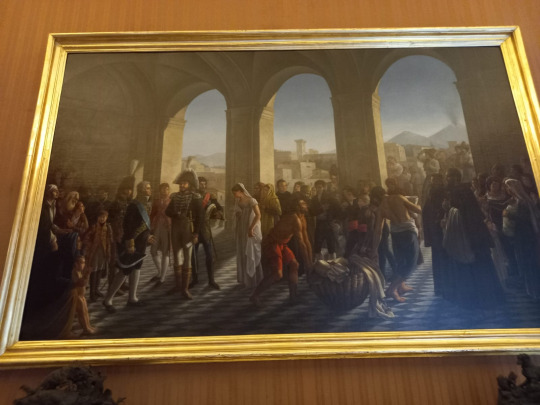
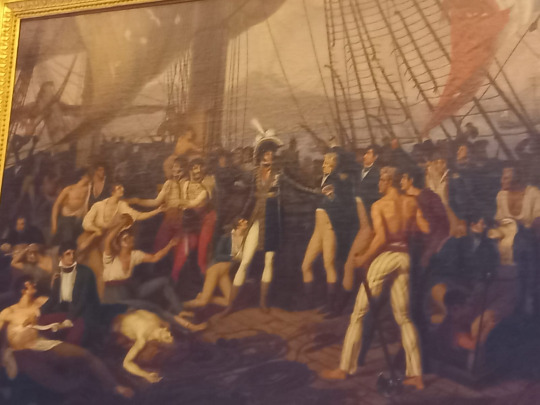

His profile on a mantlepiece, and now his bedroom!
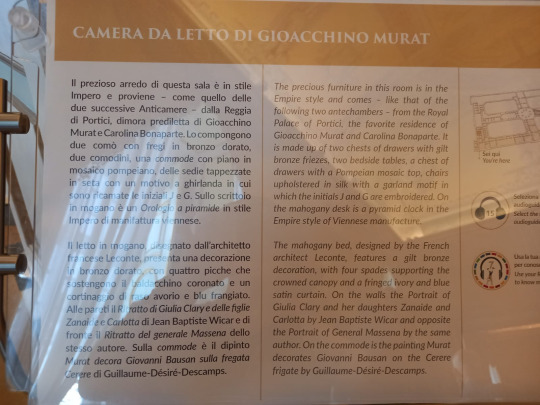

bed! blue! must’ve been cool sleeping there with the curtains closed in a tiny bubble of heat!
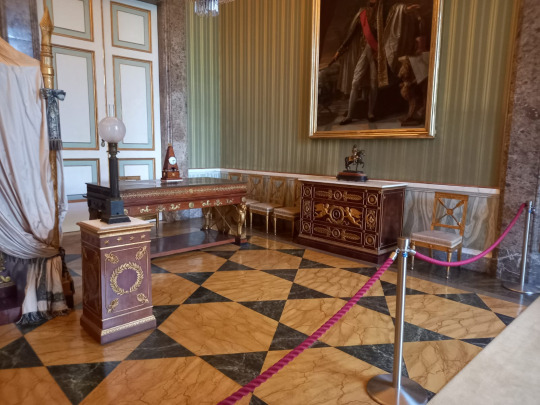
My man sure had taste in matters of furniture!
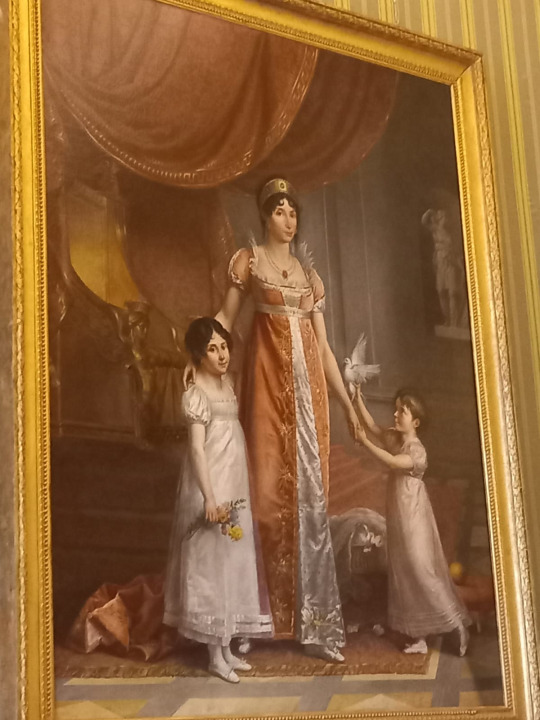
And obv Caroline with the girlssss!
There was also a fresco i didn’t photo where Mars has Murat’s face, but my friend commented that was quite the unwise thing to do, to be portrayed by the divine guy who gets slapped even by humans, right, my dear? @mostvaliantandmostpround i summon you to clarify my mythological doubts!
#Reggia di Caserta#Joachim Murat#Caroline Murat#Caroline Bonaparte#Murat's room#Re Gioacchino Napoleone#joachim and caroline murat
46 notes
·
View notes
Text
I tried to look up with whom Caroline Bonaparte had affairs and I found this website through my research and I don't know how to feel about this because these comments are not detailed and objective enough for me EVEN THOUGH there are sources mentioned at the end. With all of this in mind, I wanted to ask you all if you know more about these points and if you can confirm to have read about these incidents:
Let's look at some points which let me be confused, shall we?
1. Did Lannes and Caroline ever have a relationship/situationship?
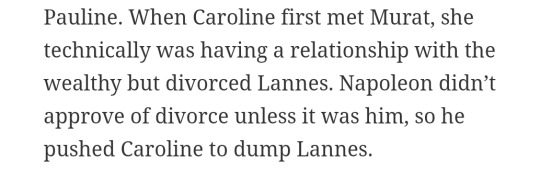
I was more confused than informed after reading these two sentences. Specifically the "unless it was him" part because I read it as if Napoleon made an exception for Lannes which he didn't? The structure of the sentence doesn't make any sense for me. At the same time, English is my third languages. Maybe I just need to read through my grammar books again and study... All of this aside, did they really have something going on?
2. Naps slapping Achille

I heard about the incident of Naps pulling at Achille's ear once but just randomely mentioning this was ???? And the thing is, this wasn't elaborated at all. When did this happen? How did this happen? How did Murat and Caroline react? I can imagine Murat getting quite protective. This incident is described as the Bonapartes disputing about something and then Napoleon slapping his nephew out of nowhere. And that's it...
3. Was Caroline really "thrilled" about the idea of staying Queen?

Pls, let me explain: I am aware of Caroline's ambitions but the verb "thrilled" sounds wrong in my eyes because, as far as I am concerned, it contains the fact that Joachim, the father of her four children, would be dead. She sounds like as if Murat didn't mean anything to her and... that wasn't the case, was it? I am open for corrections. I really want to learn.
4. This... just isn't true.

If I remember corectly, Murat's and Napoleon's relationship wasn't the best already (before Russia) because Murat wanted to reign in Naples and not to be a puppet of Napoleon.
Caroline and Murat themselves went through big highs and very big lows in 1810... i. e., Caroline went through a miscarriage.
5. Murat's indecisiveness considering leaving Napoleon's side after everything..

Gahwd, whoever wrote this, your choice of words is terrible. He wasn't an idiot. He was humane. . _.
6. Did all of the siblings really blame Caroline for everything that happened to Naps? As if they weren't done with his bullshit too... you can't tell me that Joseph wasn't just done after the peninsular war.

Why on earth would Napoleon blame Caroline for Russia? She wasn't there? In addition to that, Naps was a realist who liked to take risks and had ambitions. He is not delusional... 😭🤡
In conclusion: I am confusion.
#I am confusion#napoleon bonaparte#napoleon's marshals#joachim murat#napoleonic era#caroline murat#napoleon's family#jean lannes#Achille Murat
66 notes
·
View notes
Text
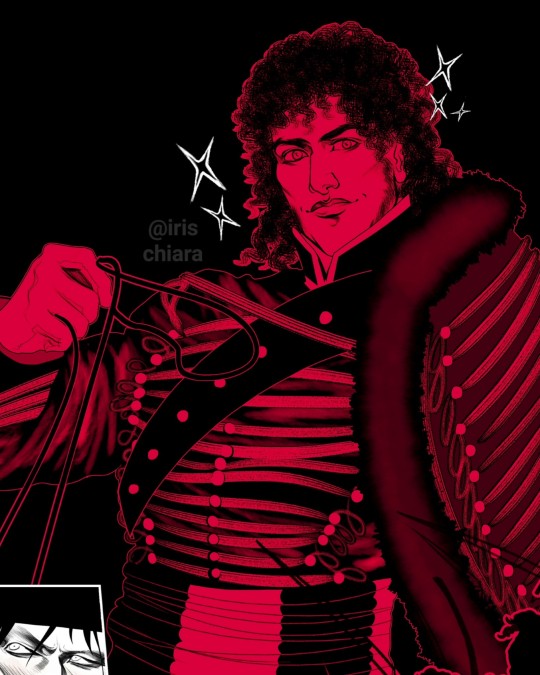
Murat in all his gorgeousness and better quality (and Napoleon's embarassed eyeroll as well)
#napoleon bonaparte#french revolution#joachim murat#caroline murat#murat#napoleon's family#frev#marshalate#13 vendemiaire#thermidor#directoire#cannons#cannonballs#junot's gonna get jealous
90 notes
·
View notes
Text
Sexy clinch 1790s French edition
#napoleon bonaparte#josephine beauharnais#charlotte robespierre#fouche#joseph fouché#herault#hérault de sechelles#suzanne de la morency#caroline bonaparte#joachim murat#murat#joseph fievée#theodore leclercq#louis-antoine saint-just#thérèse gellé#theresia cabarrus#jean-lambert tallien#camille desmoulins#lucile desmoulins#mademoiselle raucourt#sophie arnould#clinch#romance art#frev#french revolution#napoleonic era#let the games begin
58 notes
·
View notes
Text

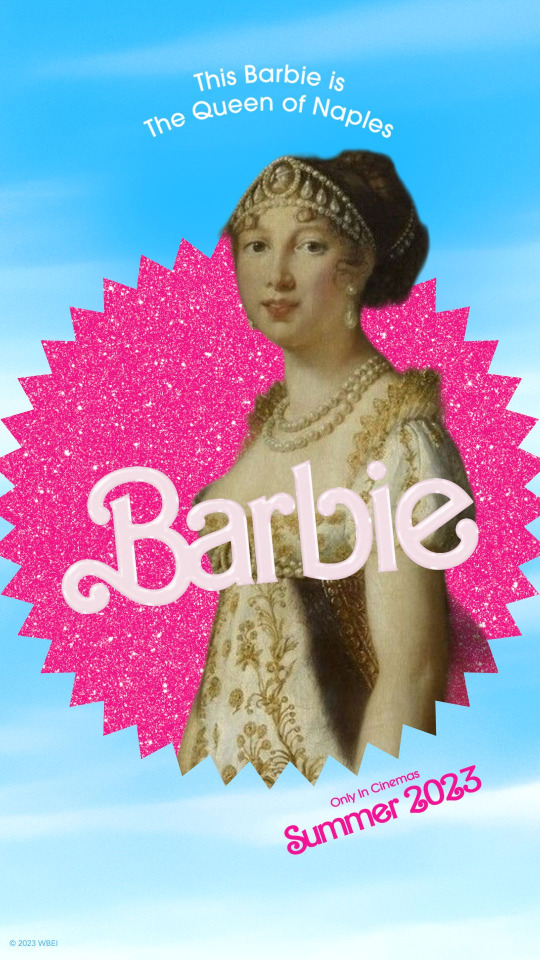
I have yet to see anyone on the Napoleonic fold playing with the Barbie Selfie thingy, so there you go, the first two Neapolitan Barbies 😌🤭😉😂✨
(pinging @joachimnapoleon , @histoireettralala and @amypihcs in particular 🤭😂🙈)
.
Bonus one↓ on Murat (the colors seem better to me IMO 🤔)

#not art#napoleonic#napoleonic era#napoleonic wars#joachim murat#marshal murat#caroline bonaparte#caroline murat#this is one of those high quality shitposts 😎💀🔥#barbie selfie generator#barbie selfie meme#history memes#sort of
35 notes
·
View notes
Text
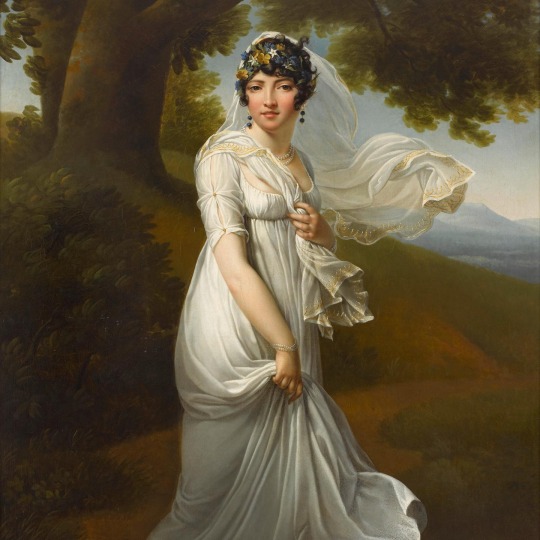
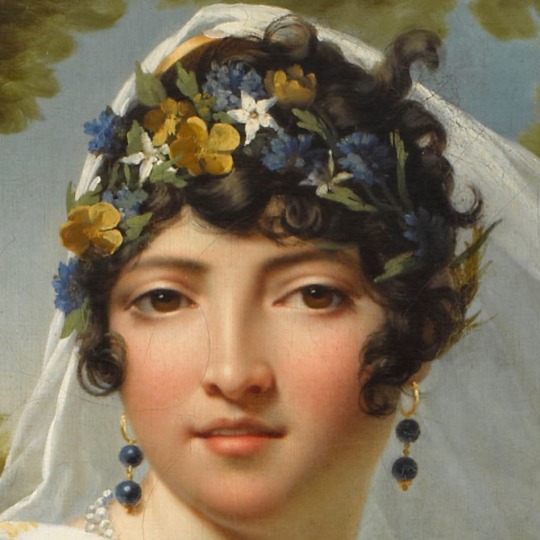
Portrait of Caroline Bonaparte Murat, the youngest sister of Napoleon
Early 19th century
#Caroline#Napoleon’s family#napoleonic era#caroline bonaparte#Caroline Murat#Caroline Bonaparte Murat#empire#empire style#first french empire#french empire#veil#regency#art#French fashion#fashion#history of fashion#laurels#laurel#flowers#wreath#19th century#first french republic#the consulate and the empire#rococo#neoclassical#neoclassicism#napoleonic#french#France#Murat
64 notes
·
View notes
Text
Happy Birthday Murat!!!!
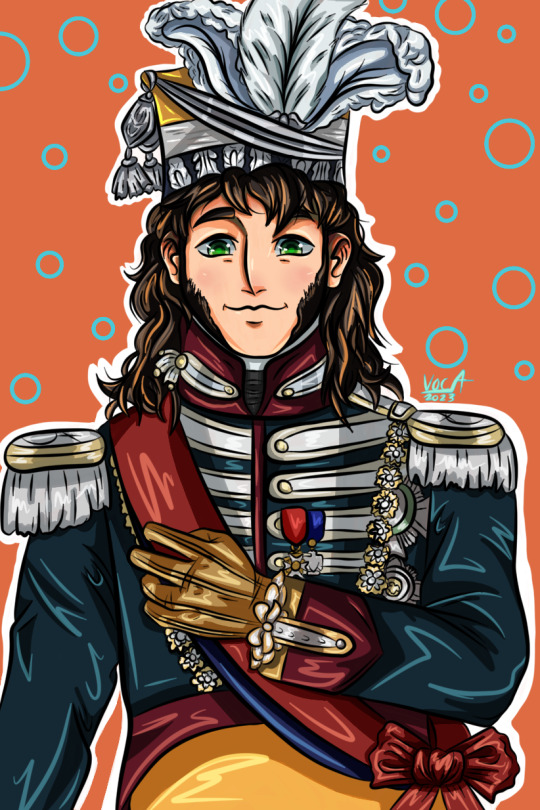
Also Caroline but I ain't got a drawing for her cuz I didn't have the time but I still want to wish her a happy birthday!!
#napoleonic era#french history#joachim murat#caroline bonaparte#my art#digital art#napoleons marshals
71 notes
·
View notes
Text
I’m thinking of taking on a project with Caroline Murat’s letters next, but I’m having trouble settling on an idea. The three options I’m looking at are:
Publish all of Caroline’s 1810 letters to Murat in installments on ProjectMurat (I’ve already got them all translated from years ago, I’d just need to clean them up, annotate them etc)
Self-publish all of those letters as a book/e-book via Amazon and/or Lulu
Compile 100 letters by Caroline to numerous people including Murat, Napoleon, her other siblings, Hortense de Beauharnais, Fouché, Ségur, Julie Récamier, and Metternich, and self-publish as Caroline Murat: A Portrait in Letters, a companion to my first book.
Thoughts?
59 notes
·
View notes
Photo

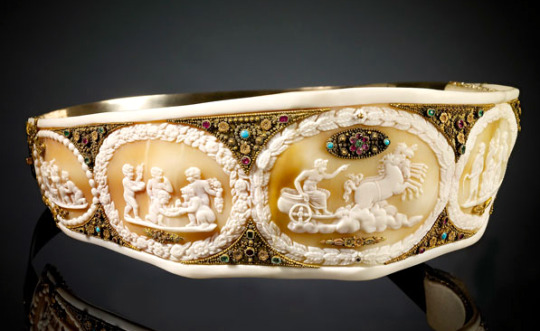

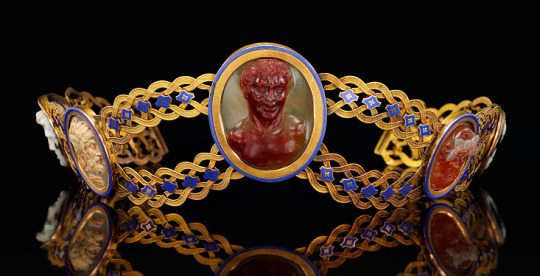


Cameo and intaglio diadems from the Napoleonic era
#neo classicism#napoleonic#napoleonic era#historical#jewellery#jewerly#fashion history#josephine de beauharnais#caroline murat#intaglio#cameo#diadem#diadems#tiara#empress josephine#caroline bonaparte#hulderposts
180 notes
·
View notes
Text
Caroline intervenes on Hortense’s behalf
In her memoirs, Hortense often portrays Caroline Murat as her arch nemesis, a rival that did not cease to torment her due to her jealousy of Hortense. I’ve for a long time suspected that this may actually be projection on Hortense’s part. In appearance at least, Caroline and Hortense were close friends, calling each other »tu« in their letters, and after Hortense’s oldest son died, Caroline dropped whatever she was doing, jumped into a carriage and went to see and console Hortense.
This is another incident when she came to her aid. The birth of Hortense’s third son, (Charles-)Louis-Napoléon, future Napoleon III, had put the final nail into the coffin of her marriage, as Louis was convinced he was not the father of this baby. (As a matter of fact, he could not be, assuming a normal pregnancy of nine months.) He had returned to Holland alone and demanded Hortense send their second child, Napoléon-Louis (I really wish they had been a little more resourceful in the naming of their children) to Amsterdam asap. Which Hortense did not want to do.
At this point, it was Caroline who went to the chateau Marrac close to Bayonne (all of this happened during the coup that put Joseph on the throne of Spain) in order to talk to Napoleon about it and to help both her friend and her brother. As Napoleon writes:

Bayonne 17 July 1808
Princess Caroline has made me aware of how unhappy you are.
He then reassures Hortense that, according to law, the mothers take care of the children up to the age of seven, that he does not want to see his nephew go to Holland (because of the famously fatal Dutch climate), and suggests, regarding finances, she should demand from Louis what basically comes down to two separate households. Regarding private matters, he continues:
[…] Essentially, the King loves you, and maybe a firm and frank exchange with him would make him return »aux procédés«. However, you have the right to be happy and the King is too reasonable not to feel that there comes an age and a rank when everyone must be given their due. If all the details given to me by Princess Caroline are correct, there is a lack of a clear understanding in all this.
I have left the expression »aux procédés« in French because I am very unsure how to translate it in this context. It can mean »to normal behaviour«. It can also mean »to standard procedure«, which could hint at some form of pretense or arrangement about this marriage even before the open break-up between Louis and Hortense. I just don’t know, for some reason it feels like a curious expression to me.
However, the interesting sentence comes next: everyone (in this state of the marriage) must be given their due, i.e., must have the right to find happiness. I think what Napoleon refers here is an agreement like they were common in political marriages of the Ancien Régime: both spouses will still work together as far as family and business matters are concerned, but privately, they can go separate ways, including sexual relations.
Most interesting that it is, once again, Caroline who acts as a mediator, this time between her brother and her friend and who talks to Napoleon on Hortense’s behalf. It shows that she was both more influential and a much better friend than Hortense would admit in her memoirs.
46 notes
·
View notes